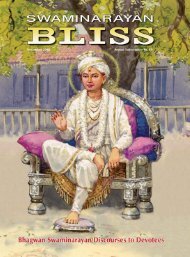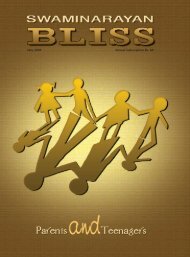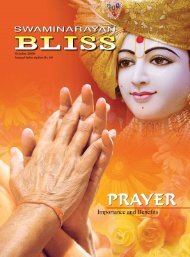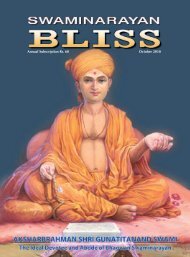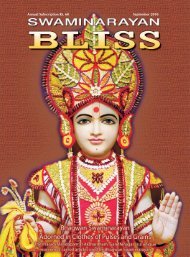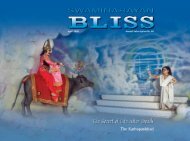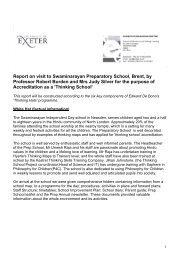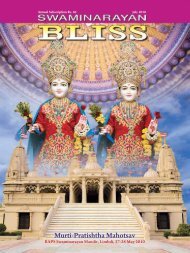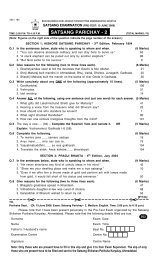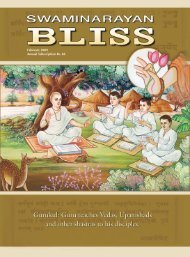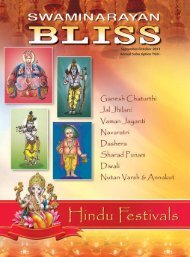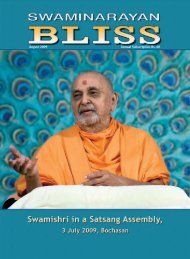May 2008 Annual Subscription Rs. 60
May 2008 Annual Subscription Rs. 60
May 2008 Annual Subscription Rs. 60
You also want an ePaper? Increase the reach of your titles
YUMPU automatically turns print PDFs into web optimized ePapers that Google loves.
<strong>May</strong> <strong>2008</strong> <strong>Annual</strong> <strong>Subscription</strong> <strong>Rs</strong>. <strong>60</strong>
228TH BIRTHDAY CELEBRATION OF BHAGWAN SWAMINARAYAN<br />
14 April <strong>2008</strong>, Sarangpur<br />
1<br />
2<br />
3<br />
1. Youths enact a drama on Bhakta Sagram’s transformation. Mandir in background.<br />
2. Swamishri on stage. 3. Devotees in the celebration assembly.<br />
Photos: Sadhu Yogicharandas
<strong>May</strong> <strong>2008</strong>, Vol. 31 No. 5<br />
CONTENTS<br />
1. Swaminarayan History<br />
Debate in Vadodara..............................4<br />
Muktanand Swami defeats the Vedantacharya...<br />
2. On Life<br />
“I Am Sorry!” .......................................7<br />
Apologize before it is too late...<br />
3. Guru Parampara<br />
Yogiji Maharaj’s Austere Life .............11<br />
Fasting – a way of life...<br />
4. Personal Development<br />
Right Hand-Left Hand ........................14<br />
Teamwork...<br />
5. Bhajan History<br />
Orã Ãvo Mãrã Lerakhadã Laheri........15<br />
On the banks of river Ghela...<br />
6. Vicharan<br />
Pramukh Swami Maharaj’s Vicharan ....16<br />
7. Inspiring Incidents<br />
Living with Swamishri .......................18<br />
Motivation and guidance...<br />
8. BAPS Festivals<br />
228th Birthday Celebration of<br />
Bhagwan Swaminarayan, Sarangpur....19<br />
9. Life Transforming Story<br />
Rishubha Vala’s Transformation ............20<br />
10. BAPS News<br />
Parents’ Meet, South Africa ...............23<br />
Visit to Elderly Homes, London .........23<br />
BAPS Swaminarayan Mandir and<br />
Guesthouse Inauguration, India........24<br />
Meals for the Needy, New Delhi.........24<br />
National Sponsored Walk, UK............25<br />
Dr. APJ Kalam Visits BAPS<br />
Swaminarayan Mandir, Toronto ........26<br />
Founder: HDH Pramukh Swami Maharaj<br />
Editor: Sadhu Swayamprakashdas<br />
Contributors: Sadhu Vivekjivandas, Sadhu Amrutvijaydas<br />
Designer: Sadhu Shrijiswarupdas<br />
Published & Printed by: Swaminarayan Aksharpith,<br />
Shahibaug, Ahmedabad–380 004. India.<br />
SUBSCRIPTION RATES<br />
Outside India (By Air Mail)<br />
India<br />
Rupees Pounds US Dollars Rupees<br />
1 Year 400 6 10 <strong>60</strong><br />
2 Years 800 12 20 110<br />
3 Years 1200 18 30 1<strong>60</strong><br />
Website: www.swaminarayan.org<br />
E-mail: magazine@swaminarayan.org<br />
FIRST WORD<br />
Bhagwan Swaminarayan emphasized the<br />
importance of doing satsang for spiritual<br />
progress and happiness. At the same time he<br />
underscored the need to refrain from kusang, or<br />
bad company, in any form. In one of his discourses<br />
he warns all devotees to avoid the four<br />
main types of kusang. The first are the<br />
Kudapanthis who dislodge you from spiritual<br />
vows (namely chastity) and make you morally<br />
impure and corrupt. The second type of persons<br />
are the Shaktipanthis who force you to eat meat<br />
and drink alcohol and deflect you from dharma.<br />
The third category are the Shaktipanthis who<br />
propagate that God’s abode, his divine form and<br />
the murtis of God’s avatars are false and thus<br />
make you stray from the bhakti and upasana of<br />
God. And finally the Nastiks who believe that<br />
only karmas are real and deny the existence of<br />
God, thereby displacing you from the path prescribed<br />
by the sacred shastras.<br />
Today, kusang comes in appealing or seemingly<br />
harmless forms like social trends and<br />
bonds, business relationships, entertainment,<br />
rationality, criticisms and glamour. As Hindus<br />
and satsangis we have to be conscious that we<br />
have our own glorious culture, faith and value<br />
systems. We need to understand and affiliate<br />
ourselves to our own philosophy, set of moral<br />
practices, rituals, place of worship, deity,<br />
sacred texts, mother tongue, festivals, and<br />
social customs. Say no to wrong things. There<br />
is no need to feel alienated or left out when<br />
you do not participate with your peers in<br />
things that do not agree with our spiritual<br />
faith and moral character.<br />
◆
SWAMINARAYAN HISTORY TRANSLATION: SADHU VIVEKJIVANDAS<br />
Debate in Vadodara<br />
On Shri Hari’s<br />
word Muktanand Swami left<br />
for Vadodara to participate in a<br />
scriptural debate against the<br />
Vedantacharya. The debate was<br />
arranged by Maharaja Sayajirao<br />
of Vadodara...<br />
It was 19 July 1818 (Ashadh vad 2, Samvat<br />
1875). Shriji Maharaj celebrated the<br />
festival of rath yatra in Gadhada. Later,<br />
he also celebrated Ganesh Chaturthi and Jal<br />
Jhilani in Gadhpur. Maharaj had decided to stay<br />
there till he got news of Muktanand Swami’s<br />
victory in a debate at Vadodara.<br />
Muktanand Swami had reached Vadodara<br />
with his group of sadhus and devotees. They all<br />
stayed at the hari mandir on the grounds of<br />
Nath Bhakta’s home. Word was sent to Maharaja<br />
Sayajirao that Muktanand Swami had arrived<br />
on Maharaj’s instruction to debate with the<br />
Vedantacharya. The Maharaja called Bhau<br />
Puranik, a member of his court, and said, “I<br />
would like to go and have the darshan of Muktanand<br />
Swami. Go and inform the members of<br />
the royal court, Ramchandra Vaidya, Shobharam<br />
Shastri, Narupant Nana, Bapu Saheb,<br />
Chimanrao Shastri and others, to accompany<br />
me. Also, make preparations for tomorrow’s<br />
debate in the royal mandir.”<br />
The Maharaja came with his leading officials<br />
to have Muktanand Swami’s darshan in the suburb<br />
of Vadi. On seeing Swami he felt a tide of<br />
joy and peace pervade his entire being. The<br />
Maharaja felt that the Vedantacharya would be<br />
defeated by the sheer saintliness of Muktanand<br />
Swami. The king narrated the Vedantacharya’s<br />
propaganda and grapevine. Then Muktanand<br />
4 Swaminarayan Bliss ◆ <strong>May</strong> <strong>2008</strong>
Swami calmly explained, “I was present when<br />
the Vedantacharya came to Vartal. Shri Hari<br />
asked him to recite and explain the twelve principle<br />
shloks of the Vedas. The acharya failed to<br />
answer. When he was asked a second question,<br />
again he was flummoxed. Still Maharaj honoured<br />
him as a Brahmin and gave him <strong>Rs</strong>. 200.<br />
But when he reached Nadiad he talked flippantly<br />
about Maharaj. So Maharaj sent Nityanand<br />
Swami to Nadiad to debate with him. But he<br />
did not go to Nityanand Swami. So, don’t<br />
believe and be taken in by anything he says.”<br />
Maharaja Sayajirao was young and intelligent.<br />
He understood the frivolity of the Vedantacharya.<br />
He ordered Bhau Puranik, “Declare in<br />
the city that tomorrow there will be an assembly<br />
in the royal mandir. The scriptural debate<br />
will be strictly between Muktanand Swami and<br />
the Vedantacharya. All the pundits sponsored by<br />
the state should be present if they wish to continue<br />
getting their monthly payments. After the<br />
debate concludes any pundit can ask questions<br />
with the coordinator’s permission. And if any<br />
pundit loses then he will not get any salary.”<br />
The next day the arrangements for the<br />
debate were made in the king’s royal mandir<br />
near Mandvi. Two seats were arranged, facing<br />
each other, for the two contestants. Another two<br />
cushions were placed for the two judges, Chimanrao<br />
Shastri and Bhau Puranik. Muktanand<br />
Swami came with devotees to the venue singing<br />
a bhajan, “Vãhalã rumjhum kartã Kãn…” The<br />
Vedantacharya also arrived with pomp backed<br />
by the evil Vitthalrao Diwan. Accompanying<br />
him were some bawas, who were barred from<br />
entering the assembly at the Maharaja’s word.<br />
The assembly hall soon became packed with<br />
many pundits, citizens and royal officials.<br />
Muktanand Swami prostrated before the<br />
deity in the royal mandir. Then he prayed to<br />
Shri Hari before taking his seat. The assembly<br />
was impressed by the glow of austerity and<br />
brahmacharya on Muktanand Swami’s face. His<br />
saintliness and devotion touched the audience.<br />
The Vedantacharya, however, came to the<br />
assembly and straightaway climbed onto his<br />
seat. His face showed signs of ostentation and<br />
vanity. The two judges, Chimanrao Shastri and<br />
Bhau Puranik, took their seats.<br />
Muktanand Swami suggested that they begin<br />
by singing the peace mantras and a prayer. The<br />
debate started at 9.00 am. Muktanand Swami<br />
looked at the Vedantacharya. The latter recognized<br />
Swami to have been present during his<br />
debate with Shriji Maharaj in Vartal. He quivered<br />
with fear, thinking that Swami would talk<br />
about his defeat in Vartal. Muktanand Swami<br />
had decided to reveal the facts regarding his<br />
defeat at Vartal. He asked the Vedantacharya,<br />
“You had come to Vartal to debate with Bhagwan<br />
Swaminarayan. The Lord had told you to<br />
recite the twelve great shloks of the Vedas. Do<br />
you remember that occasion? Furthermore, you<br />
were asked to explain how the Vedas came into<br />
existence and describe the form of Akshar. Did<br />
you answer those questions? Let us begin<br />
today’s debate with those questions.”<br />
The Vedantacharya was still ignorant about<br />
the twelve shloks. On facing the same questions<br />
again he felt drained of strength and nervous.<br />
Vitthalrao Diwan and the other pundits saw the<br />
blank and beaten face of the Vedantacharya.<br />
The pundits realized that he was a charlatan. A<br />
wave of protests surged through the assembly<br />
of pundits. But before anybody could react<br />
Muktanand Swami urged, “Acharya, speak the<br />
truth. We are in a royal mandir and in the<br />
divine presence of the deity. Tell the assembly<br />
what had happened in Vartal.” The two judges<br />
also told the Vedantacharya to speak the truth.<br />
Finally, the crestfallen Vedantacharya confessed,<br />
“Bhagwan Swaminarayan is great. To<br />
make me feel easy despite my defeat and with<br />
due respect to my Brahmin birth and my status<br />
as an acharya, he gifted me <strong>Rs</strong>. 200. I, out of<br />
my misplaced abhorrence for him and wrong<br />
guidance from others, propagated lies about<br />
him.”<br />
<strong>May</strong> <strong>2008</strong> ◆ Swaminarayan Bliss 5
On hearing this Vitthalrao Diwan turned red<br />
with rage and hissed, “You liar and deceiver!<br />
You played a trick upon me!”<br />
Instantly Bhau Puranik checked him, “Diwan<br />
Saheb, this is a spiritual assembly. It is not right<br />
of you to utter such words. Though you are a<br />
Diwan, we are the judges, therefore you’ll have<br />
to speak with respect and in accordance with<br />
the rules.”<br />
The two judges declared, “Today, no scriptural<br />
debate has taken place in the assembly, but<br />
Muktanand Swami’s saintliness and his bhakti<br />
for Bhagwan Swaminarayan have left a deep<br />
and abiding impression on the whole assembly.<br />
We therefore announce Muktanand Swami as<br />
the winner.” The devotees were enthused at the<br />
declaration, whereas the Diwan got up angrily,<br />
rubbed his hands vigorously and stomped out of<br />
the assembly.<br />
Then the pundits in the assembly asked<br />
Muktanand Swami to explain the differences<br />
between ekantik dharma and ordinary dharma,<br />
and bhakti and bhakti coupled with God’s glory.<br />
Muktanand Swami answered the questions to<br />
everyone’s satisfaction. The pundits and the lay<br />
audience were pleased with Swami’s simple<br />
answers and modesty. The audience garlanded<br />
Muktanand Swami. The Maharaja honoured<br />
Swami with a garland and said, “The Vedantacharya’s<br />
behaviour and propaganda was full<br />
of guile.”<br />
Muktanand Swami revealed, “Maharaj had<br />
told me in Gadhada that no scriptural debate<br />
would take place; instead the Vedantacharya<br />
would be exposed. Maharaj said that I had to<br />
go so that people could realize the truth.”<br />
Bhau Puranik, the king’s official, added,<br />
“Your explanation of the differences between<br />
dharma and ekantik dharma and the meaning of<br />
bhakti coupled with God’s glory is not easily<br />
found in the shastras.”<br />
Muktanand Swami replied, “Shriji Maharaj<br />
has explained such important principles in a<br />
simple manner. The shastras are like an ocean<br />
and their essence can only be understood<br />
through a guru.” Then Muktanand Swami and<br />
his sadhus and devotees left, singing kirtans on<br />
their way to the Vadi mandir. News soon spread<br />
that the Vedantacharya had been defeated. Thus<br />
hundreds of people stood by the wayside for<br />
Swami’s darshan.<br />
The devotees of Vadodara wrote a letter to<br />
Shriji Maharaj, describing the debate and defeat<br />
of the Vedantacharya. Nath Bhakta and Jusaji<br />
set off to deliver the letter to Maharaj. They<br />
reached Gadhada in two days. After the two<br />
prostrated before Shri Hari, Nath Bhakta<br />
announced with joy, “Muktanand Swami won<br />
the debate in the royal court in Vadodara. The<br />
Vedantacharya confessed about his wrongdoings<br />
and apologized in public.”<br />
Shri Hari stood up and happily exclaimed,<br />
“What did you say! Swami won the debate!” He<br />
then embraced both Nath Bhakta and Jusaji<br />
with joy. “Have you brought a letter?” Maharaj<br />
enquired. Shukmuni Swami read the letter<br />
aloud. Maharaj was very happy. He asked Nath<br />
Bhakta as to when they had left Vadodara.<br />
“Two days ago. We travelled hurriedly, without<br />
resting on the way.”<br />
Maharaj saw that they were fatigued. He<br />
called Motiba (Jivuba) and informed her of<br />
Muktanand Swami’s victory in Vadodara. Then<br />
Maharaj pointed to Nath Bhakta and Jusaji and<br />
said, “They have come here briskly, without<br />
resting on the way. Give them gur and ghee to<br />
replenish their strength and prepare hot water<br />
for them to bathe and relax.” Then Maharaj<br />
added, “Motiba, tell all that my guru Muktanand<br />
Swami has won a debate in the royal<br />
court of Vadodara and declared that Swaminarayan<br />
is God.”<br />
◆<br />
(To be contd.)<br />
6 Swaminarayan Bliss ◆ <strong>May</strong> <strong>2008</strong>
ON LIFE SADHU GNANPURUSHDAS<br />
“I Am SORRY!”<br />
that by saying I’m deeply<br />
sorry, it might not be enough and<br />
“Irealize<br />
sufficient to address the pain and<br />
hurt I’ve caused you.”<br />
Marion Jones, the golden girl of the Sydney<br />
Olympics, wept openly as she uttered these<br />
words on 6 October 2007. It was a sad day for<br />
sport.<br />
The only woman in history to win five<br />
medals in athletics at a single Olympics finally<br />
admitted in the New York District Court to having<br />
taken performance-enhancing drugs. A<br />
sprinter and long-jumper, who won three gold<br />
and two bronze medals in the 2000 Olympics,<br />
she had repeatedly denied taking steroids. But<br />
finally, she apologized to the world for her<br />
actions. She admitted she had taken drugs from<br />
September 2000 to July 2001.<br />
“I want you to know that I’ve been dishonest…<br />
I have let my country down; I have let<br />
myself down. I betrayed your trust,” said Jones<br />
outside the court.<br />
“Sorry seems to be the hardest word,” a<br />
famous star once opined.<br />
Indeed, for Marion Jones it was hard enough<br />
admitting her mistake. However, one can guess<br />
that she probably had little choice, knowing<br />
that she would face a severe penalty if she did<br />
not plead guilty.<br />
A commentator writes that sorry may seem<br />
to be the hardest word for many of us, but<br />
atonement is the new selling factor for celebrities.<br />
In other words, the word ‘sorry’ is uttered<br />
not so much out of fear of possible punishment<br />
but simply to bury the past.<br />
The French football maestro Zinedine Zidane<br />
recently apologized for his infamous head butt<br />
on Italian defender Marco Materazzi in the<br />
2006 World Cup Final in Germany. “It was inexcusable.<br />
I apologize,” he said.<br />
More recently, the Argentine football legend,<br />
Diego Maradona, put to rest the longest-running,<br />
most-debated and much-relished episode<br />
in footballing history. In an interview, the little<br />
<strong>May</strong> <strong>2008</strong> ◆ Swaminarayan Bliss 7
genius apologised for his<br />
‘Hand of God’ goal in the<br />
1986 World Cup quarterfinal<br />
against England in Mexico.<br />
Maradona scored both<br />
goals in the 2-1 victory over<br />
England more than 20 years<br />
ago. His first goal in the<br />
quarter-final match was deemed by the match<br />
referee to be a legitimate header past England<br />
goalkeeper Peter Shilton, but replays confirmed<br />
he had illegally punched the ball in with his<br />
hand.<br />
“If I could apologise and go back and change<br />
history, I would,” said Maradona.<br />
Many experts have commented that<br />
Maradona’s statement itself deserves to be a<br />
subject of debate – maybe for another 20 years<br />
to come!<br />
BUSINESS SENSE<br />
Over the years, many sportspersons, politicians,<br />
and religious and social leaders have<br />
gathered enough courage to apologize and bury<br />
their erroneous past. Sometimes, even corporate<br />
giants have said sorry to save their reputation<br />
and their share of the market. For instance, in<br />
1982, Johnson and Johnson recalled 30 million<br />
bottles of Tylenol pills from retail stores after<br />
seven people died from cyanide-laced pills.<br />
(Time, 30 April 2007). The company dealt with<br />
the potentially damaging situation by issuing a<br />
public apology and introducing tamper-proof<br />
packaging.<br />
In another incident, it was reported that<br />
David Neeleman, CEO of JetBlue, an American<br />
budget airline, embarked on a week-long media<br />
apology tour after 100,000 travellers were<br />
stranded when “bad weather decimated its<br />
operating ability.” In one case, JetBlue passengers<br />
were left on a snowed-in runway for more<br />
than nine hours. Neeleman was reported to<br />
have said sorry in national newspaper ads:<br />
“Words cannot express<br />
how truly sorry we are<br />
for the anxiety, frustration<br />
and inconvenience<br />
that you, your family,<br />
and friends and colleagues<br />
have experienced.”<br />
Saying sorry is effective.<br />
Just imagine how you would feel if you<br />
were offended or wronged by a person; what<br />
would be your reaction if the person did not<br />
want to acknowledge his or her mistake and<br />
apologize for it?<br />
The chances are that you would hold a<br />
grudge against that person and probably share<br />
such sentiments in your social circles.<br />
MISSED OPPORTUNITIES<br />
Why would saying sorry – no matter how<br />
hard it is – still be important? Why do some<br />
people find it harder to say sorry than others?<br />
One would venture to guess that pride and<br />
ego hold some of us back in saying it. We know<br />
for sure that not admitting a mistake can be<br />
very detrimental – not only for personal relationships<br />
but also for seeking solutions. Depending<br />
on the nature of the mistake, not admitting<br />
one can possibly have catastrophic consequences.<br />
In 2000, the Japanese company Snow Band<br />
did not react to reports of outbreaks of food<br />
poisoning caused by their milk product until<br />
some <strong>60</strong> hours after the first reported incidents.<br />
Five days later, some 6,000 people had become<br />
sick. Consumers and the media were outraged<br />
that top executives in Tokyo had not even<br />
acknowledged the incident, let alone take<br />
responsibility for it. Consequently, the company<br />
went out of business.<br />
Whilst the kind of mistakes we make in our<br />
everyday lives may not cause catastrophes or<br />
affect too many people, the negative consequences<br />
of not admitting our mistakes can<br />
8 Swaminarayan Bliss ◆ <strong>May</strong> <strong>2008</strong>
nonetheless be harmful and disastrous. Personal<br />
relationships can be damaged. More importantly,<br />
doors to solution-finding remain stubbornly<br />
locked. Admitting a mistake and apologising for<br />
it is the key – if not crucial – requirement in<br />
unlocking the door to find a positive way forward.<br />
TAKING THE BLAME<br />
On the spiritual path, too, one can progress<br />
rapidly if one admits one’s mistakes and learns<br />
from them.<br />
In his inspiring spiritual talks, Gunatitanand<br />
Swami says, “God does not look at the faults of<br />
jivas. If a jiva prays to God and says, ‘I am at<br />
fault, then God forgives him for his mistakes.’ ”<br />
Yogiji Maharaj often said, “I feel happy when<br />
someone points out my mistakes. It gives me an<br />
opportunity to improve and become better.”<br />
Yogiji Maharaj’s humility was such that he<br />
tolerated the insults of others, even though he<br />
was never at fault. On the contrary, he willingly<br />
apologized to his persecutors, calmed them and<br />
made them feel happy.<br />
God-realized Sadhus like Shastriji Maharaj,<br />
Yogiji Maharaj and Pramukh Swami Maharaj<br />
often take the blame upon themselves for the<br />
mistakes of others. Moreover, they never feel<br />
small or inferior in apologizing to others.<br />
Saying sorry in this way can reverse ill feelings<br />
and open the way to finding solutions.<br />
In 1980, Pramukh Swami Maharaj<br />
was in London, England. The local<br />
devotees had organized a satsang<br />
outing at Epping Forest. Swamishri,<br />
along with all the sadhus, was<br />
scheduled to arrive there by 10.00<br />
am. Everyone had been looking forward<br />
to this event for a long time.<br />
Men, women and children from all<br />
over the UK had arrived early with<br />
enthusiasm and waited eagerly for<br />
Swamishri’s arrival. But Swamishri<br />
was somehow delayed.<br />
Finally, when he did arrive with a few<br />
trustees, it was already 12.30 pm. All the devotees<br />
were frustrated. Matters were made worse<br />
by a sudden downpour of rain which further<br />
dampened everyone’s spirits. The situation got<br />
to a head when it was decided to abandon the<br />
event due to the rain. Everyone went home feeling<br />
dejected because they did not get<br />
Swamishri’s presence for the whole assembly. It<br />
was natural in this situation to assign the blame<br />
on the trustees, since they had organized the<br />
home visits which had delayed Swamishri. A<br />
cloud of dissatisfaction and blame loomed all<br />
over. Swamishri came to know about the disheartened<br />
spirits of devotees and quickly<br />
stepped in to rectify the situation. The next day,<br />
he apologized before the assembly, “Look, whatever<br />
happened yesterday at Epping Forest is<br />
totally my own fault. The trustees were driving<br />
me to the park, but it was I who insisted on the<br />
home visits. As a result, we were delayed and<br />
could not make it on time. I am sorry.”<br />
In reality, it was nobody’s fault, least of all<br />
Swamishri’s, for he was delayed due to circumstances<br />
beyond his control. But Swamishri took<br />
the blame upon himself and restored harmony.<br />
Everyone realized their<br />
own mistakes and they<br />
themselves apologized to<br />
Swamishri for their erratic<br />
behaviour and impatience.<br />
Swamishri never<br />
feels small in saying sorry,<br />
even though he is not at fault.<br />
In 1987, Swamishri, along with a<br />
large contingent of BAPS sadhus and<br />
devotees, embarked upon a pilgrimage<br />
of Uttarakhand in the Himalayas<br />
(Yamunotri, Gangotri, Kedarnath and<br />
Badrinath). The whole event was<br />
planned well in advance. A group of<br />
sadhus had also carried out a pilot tour<br />
of the whole pilgrimage just to finalize<br />
the route and make arrangements. They<br />
<strong>May</strong> <strong>2008</strong> ◆ Swaminarayan Bliss 9
ooked guesthouses, hotels and ashrams well in<br />
time for the huge entourage. Everything was set<br />
for the pilgrimage to begin.<br />
The Uttarakhand yatra is an important<br />
Hindu pilgrimage. Many people from all over<br />
the world do it at least once in their lifetime. It<br />
was quite a coincidence that the Parmar family<br />
from London, England, had also embarked on<br />
this yatra at the same time as Swamishri and<br />
the sadhus. However, because they had not<br />
planned in advance, they could not find suitable<br />
accommodation at any of the places. As a result<br />
the family was furious and they wrote a stern<br />
letter to Swamishri on their return to London.<br />
“We came on this yatra hoping to find<br />
accommodation. But wherever we went, they<br />
were fully booked because of your sadhus and<br />
devotees. Our yatra was ruined…”<br />
Others would have brushed the letter aside.<br />
How could anyone wrongly blame Swamishri?<br />
But Swamishri pacified the Parmar family<br />
with a letter of apology, “I am sorry for the<br />
trouble and inconvenience we had caused. We<br />
would have been more than happy to arrange<br />
your accommodation if you had informed us<br />
then. We pray for you and your family.”<br />
Swamishri never bears grudges with others,<br />
even if they wrongly assign blame to him.<br />
Swamishri’s life is an inspiration for all. With<br />
his ego-free personality he teaches us to live in<br />
harmony.<br />
Sorry may be the hardest word to say. But by<br />
saying sorry we can improve our personal and<br />
professional reputation. Next time, you feel like<br />
saying sorry to someone, just go ahead. Don’t<br />
allow your pride and ego to block your path of<br />
constructive action.<br />
Furthermore, reading satsang books and<br />
inspiring biographies, performing rituals like<br />
arti, mansi puja and introspection, and daily<br />
practice of yoga helps in improving our attitudes<br />
and behaviours.<br />
◆<br />
008-130-75751<br />
Riya Jitubhai Patel<br />
53, Swapna Shrushti,<br />
Ambavadi,<br />
AHMEDABAD-380015<br />
BL-JUNE/08<br />
When does your<br />
subscription end?<br />
This is the date when your<br />
subscription ends.<br />
Dear Readers, on the address label of every<br />
Swaminarayan Bliss issue, a date is printed of when<br />
your subscription ends. Please check this date and<br />
renew your subscription at the nearest BAPS bookstall.<br />
To save yourself the trouble of having to subscribe<br />
every year, send a three-year subscription.<br />
SUBSCRIPTION RATES<br />
Outside India (By Air Mail)<br />
India<br />
Rupees Pounds US Dollars Rupees<br />
1 Year 400 6 10 <strong>60</strong><br />
2 Years 800 12 20 110<br />
3 Years 1200 18 30 1<strong>60</strong><br />
SWAMINARAYAN BLISS<br />
Swaminarayan Aksharpith, Shahibaug Road,<br />
Ahmedabad-380 004, India<br />
Website: www.swaminarayan.org,<br />
E-mail: magazine@swaminarayan.org<br />
10 Swaminarayan Bliss ◆ <strong>May</strong> <strong>2008</strong>
GURU PARAMPARA TRANSLATION: RAM MURTHY<br />
YOGIJI MAHARAJ’S<br />
AUSTERE LIFE<br />
From a young age Yogiji Maharaj had made<br />
austerity, and in particular fasting, the cornerstone<br />
of his way of life.<br />
He led by example and inspired many youths<br />
to lead austere lives...<br />
‘YOGI’<br />
When Jina Bhagat was initiated into the<br />
sadhu order, he was named Gnanjivan Swami.<br />
Shortly after initiation Gnanjivan Swami<br />
went with some other sadhus for darshan to the<br />
Nar-Narayan Mandir in Kalupur, Ahmedabad.<br />
The next day, the young sadhus walked 10½<br />
miles to the Adalaj Vav (stepwell), which had<br />
been sanctified by Shriji Maharaj. After darshan<br />
and bathing at the well, others had their afternoon<br />
meal. Then they came to know that Gnanjivan<br />
Swami and Hariprasad Swami were fasting.<br />
Everybody was surprised at the steadfastness<br />
of the two young sadhus, who refused to eat<br />
anything despite walking a distance of 21 miles<br />
that day.<br />
Gnanjivan Swami would fast for two days at<br />
a time. He ate only simple food like rotlas, dal<br />
and buttermilk after offering them to Thakorji,<br />
and refused to eat rich foods. He used to sleep<br />
on a jute sack and used his arm for a pillow.<br />
Due to his austere life, people began to call<br />
him ‘Yogi’ Swami’.<br />
TWO FASTS IN A ROW<br />
Yogiji Maharaj delighted in preparing food<br />
and feeding others daily, even though he himself<br />
would often fast. One day in Gondal, Shastriji<br />
Maharaj asked in the post-lunch assembly,<br />
“Where is Yogi Maharaj?” Nobody replied. Then<br />
he said, “Somebody find out if he has eaten.” A<br />
couple of devotees went; they found Yogiji<br />
Maharaj washing the utensils. They said, “Shastriji<br />
Maharaj wants to know if you have eaten.”<br />
Yogiji Maharaj replied, “I am fasting today.”<br />
The devotees were astonished, because the<br />
previous day it was ekadashi and he had already<br />
observed a waterless fast. It was nothing new<br />
for him. Yogiji Maharaj often observed two fasts<br />
in a row without others knowing about it.<br />
The devotees bowed their heads in reverence<br />
at Yogiji Maharaj’s feet.<br />
FOOD ONLY FOR OTHERS<br />
Shastriji Maharaj sent Yogiji Maharaj, Nirgun<br />
Swami and some senior devotees of Ahmedabad<br />
for the murti-pratishtha at Nenpur mandir. On<br />
this occasion Yogiji Maharaj affectionately<br />
served dudhpak-puri to the devotees. After the<br />
<strong>May</strong> <strong>2008</strong> ◆ Swaminarayan Bliss 11
function was over, everyone returned to Ahmedabad.<br />
The devotees spoke in glowing terms<br />
about the way Yogiji Maharaj had fed them.<br />
Shastriji Maharaj then told them, “Ask Yogiji<br />
Maharaj how much dudhpak-puri he ate.” When<br />
the devotees asked him, Yogiji Maharaj replied<br />
with a smile, “I am fasting.” This was Shastriji<br />
Maharaj’s way of reminding people about Yogiji<br />
Maharaj’s greatness.<br />
SETTING AN EXAMPLE TO OTHERS<br />
On Ekadashi Yogiji Maharaj would often say,<br />
“There are many advantages in fasting. Indigestion<br />
is cured. We gain strength. We increase our<br />
self-confidence. We please God. By fasting and<br />
introspecting we gain control over our limbs,<br />
mind, etc. If we observe a fast every five days<br />
then it becomes a habit. Fasting keeps us alert.”<br />
By listing all these advantages, Swamishri<br />
encouraged all the youths to fast.<br />
He further said, “Don’t sleep during the day<br />
when you are fasting. We should never miss an<br />
opportunity to fast. In fact, we should go in<br />
search of it. If it is too difficult to go without<br />
food, we can sip a little water in the evening.<br />
When I was fasting, I would feel very thirsty.<br />
During daytime I would turn the mala, wash<br />
utensils and cook. In this fashion I would be<br />
evading sleep. At 4 o’clock I would go to the<br />
assembly. I used to get up at 3.30 in the morning<br />
on the day I had to break the fast.”<br />
RIGOROUS PRACTICES<br />
As it was Janmashtmi Swamishri was observing<br />
a waterless fast. Several sadhus requested<br />
him not to undertake the rigorous fast because<br />
of his advanced age. Yogiji Maharaj flatly<br />
refused and said, “Shastriji Maharaj had undertaken<br />
such fasts even when he was 80. I am<br />
only 73 years old. If you let me fast I shall take<br />
you all to Akshardham. I shall see to it that this<br />
is your last birth. But let me undertake the<br />
fast.” They all felt powerless before his determination.<br />
“I PITY THE JIVA”<br />
Once, Yogiji Maharaj had asked a young boy<br />
named Hitesh to observe a fast. The youngster<br />
found it extremely difficult to observe the<br />
waterless fast, but he somehow managed till the<br />
evening. Then he could bear it no longer. He<br />
requested a youth called Pinakin, “Tell Bapa to<br />
relax the vow and permit me to drink water.” As<br />
it was time for Swamishri’s bath, Hitesh went<br />
along with the other helpers. Yogiji Maharaj<br />
asked, “Who is fasting today?”<br />
On learning that Hitesh was observing a fast,<br />
he asked, “Guru, is your fast first class or second<br />
class? Did you take water?” Yogiji Maharaj<br />
regarded a waterless fast as first class and one<br />
with water as second class. Hitesh replied,<br />
“Bapa, I have not taken any water. But I can no<br />
longer continue this waterless fast.”<br />
“Guru,” Swamishri said, as if imparting<br />
strength, “we should not drink water. We should<br />
always be in the first (class). Here, take these<br />
blessings. You will not feel the rigours of fasting.”<br />
Hitesh was on the verge of tears. But<br />
Swamishri would not relent. When Pinakin saw<br />
that Swamishri appeared unbending, he said,<br />
“Don’t you pity this small boy? He fell down in<br />
the afternoon. Please let him drink water.”<br />
Yogiji Maharaj looked at Pinakin and said,<br />
“You are taking pity on his body. I am pitying<br />
his jiva.” Then he told Hitesh, “Go and drink<br />
water. But only a glass.”<br />
How can any ordinary individual understand<br />
the spirit behind Swamishri’s seeming sternness.<br />
He wished for the spiritual good of Hitesh. He<br />
had no intention of putting him in pain and discomfort.<br />
‘YOGI YOUTH COLLEGE OF FASTING’<br />
12 Swaminarayan Bliss ◆ <strong>May</strong> <strong>2008</strong>
For Yogiji Maharaj fasting was his matchless<br />
weapon. To him it was a panacea to cure the ills<br />
that confront modern youth. He used it to instill<br />
nobility and goodness in them.<br />
Once, Yogiji Maharaj was wearing his<br />
dhotiyu after his bath. A large group of youths<br />
was present. So, he asked five to seven youths<br />
to observe a fast the following day. Meanwhile,<br />
another youth came for darshan. Swamishri<br />
asked him, “Are you going to observe a fast<br />
tomorrow?” “Yes, Bapa,” he replied.<br />
“It has to be a waterless fast,” saying this he<br />
patted his back. Laughing, Yogiji Maharaj said,<br />
“This is a college for fasting. Whoever comes<br />
here has to take his turn at fasting.”<br />
Pinakin suggested a name, “Yogi Upvas College<br />
(Yogi College of Fasting).”<br />
“No, Yogi Yuvak Upvas College (Yogi Youth<br />
College of Fasting),” Swamishri corrected.<br />
Youngsters, who usually ate four or five times a<br />
day, would undertake waterless fasts at<br />
Swamishri’s command. They would even willingly<br />
ask him for permission to undertake fasts.<br />
Youths who came to serve him had to undertake<br />
a fast once every five days. One day, while Yogiji<br />
Maharaj was having his bath, he spotted a<br />
new face. Swamishri asked him, “Who are<br />
you?”<br />
“Bapa, I stay in the neighbourhood.”<br />
“Where do you come from?”<br />
“I belong to Viramgam. I am studying here.”<br />
“What are you studying?”<br />
“I am studying commerce.”<br />
“What is your name?”<br />
“Mahendra.”<br />
“Will you fast tomorrow?”<br />
The youth nodded his head as a sign of<br />
agreement. Yogiji Maharaj took the boy’s head<br />
in his lap and said lovingly, “Don’t nod your<br />
head, say ‘yes, I shall fast.’ ”<br />
This was a daily occurrence. Youths would<br />
bring their friends for Swamishri’s darshan and<br />
introduce them to him. Yogiji Maharaj would<br />
call them with affection. He would make<br />
inquiries about them, and then would lovingly<br />
ask them to undertake a fast. The young new<br />
comers would accept Swamishri’s order to fast<br />
with enthusiasm. Even young boys would joyously<br />
undertake a fast. This made everyone<br />
wonder whether they were on earth or in<br />
Akshardham.<br />
On special days, like nom, ekadashi, Ram<br />
Navmi, Janmashtmi, Swamishri would make a<br />
note of those willing to fast. Many times the list<br />
would contain hundreds of names.<br />
During the month of Shravan many youths<br />
and boys would observe extra fasts to please<br />
Swamishri.<br />
MIDNIGHT WISH<br />
Swamishri had come to Bochasan from<br />
Ahmedabad for the Guru Purnima festival. He<br />
arrived in Bochasan at 11.30 pm. Thousands of<br />
devotees were waiting for his darshan. He was<br />
very tired. When he came to his room, it was<br />
almost midnight. Everyone was feeling sleepy.<br />
Swamishri met the devotees and while blessing<br />
them said, “Tomorrow everyone has to observe<br />
a fast. It is Guru Purnima. A waterless fast will<br />
bring immense benefits.” Everyone accepted the<br />
order.<br />
❀ ❀ ❀<br />
In today’s materialistic world the senses hold<br />
sway and means like fasts to control the body<br />
are ridiculed. In such circumstances, youths and<br />
boys enthusiastically undertaking waterless fasts<br />
at Swamishri’s command was a miracle indeed.<br />
Gunatitanand Swami has said in his talks, “One<br />
fast here (on earth) equals a hundred observed<br />
in Badrikashram and a thousand in Shvetdwip.”<br />
Thus, fasting is beneficial, both for physical<br />
health and spiritual progress.<br />
◆<br />
<strong>May</strong> <strong>2008</strong> ◆ Swaminarayan Bliss 13
PERSONAL DEVELOPMENT RITESH GADHIA<br />
Dilip: Yesterday’s sabha<br />
was enjoyable – the speech by<br />
Anil about being positive about others<br />
was really nice, though I’m not sure<br />
whether its practical.<br />
Chintan: I think its practical, and in fact<br />
necessary. Lets say I praise your handwriting –<br />
and I say that your right hand writes neatly but<br />
your left hand doesn’t. Would that upset your<br />
left hand?<br />
Dilip: What a strange thought – no, it<br />
would not. It’s a part of me, and you’re praising<br />
me, not just the hand.<br />
Chintan: What if I praise your son Dhruv,<br />
saying that he sings bhajans better than you do<br />
– would you be jealous or proud?<br />
Dilip: Proud, of course. Dikro kono chhe!<br />
Chintan: And what if I praise some other<br />
member of your bhajan team – say, Falgun?<br />
Dilip: Well, he’s a good singer and tabla<br />
player, of course, but I don’t think he puts as<br />
much devotion into it as he should. He needs to<br />
improve.<br />
Chintan: So, you wouldn’t really like it,<br />
and you’re criticizing him just because I praised<br />
him. As part of a team, don’t you think you<br />
should treat him like your right hand – and not<br />
as a totally separate person?<br />
Dilip: Look, there’s a difference – he’s a different<br />
person, not my hand nor my son.<br />
Chintan: True, but our<br />
body works in unison because<br />
it is guided by one brain. And a<br />
family binds together if it is guided by<br />
one person. A good team will follow instructions<br />
or rules from its leader. Whose instructions<br />
should you, Dilip, follow?<br />
Dilip: As satsangis, we need to take our<br />
inspiration from and obey Pramukh Swami<br />
Maharaj – he is our brain!<br />
Chintan: Then just as there are no fights<br />
between our right and left hand, there will be<br />
no arguments between us.<br />
Dilip: You really present funny ideas – I was<br />
trying to imagine what would happen if our left<br />
and right hands do start fighting...<br />
Chintan: Well, it might sound funny but it<br />
is real enough – we all are Swami Bapa’s hands.<br />
And if your hands fight, one of them may or<br />
may not win, but you will definitely lose. Similarly<br />
if we argue or fight, one of us might feel, ‘I<br />
have won’ – but Swami Bapa will have lost. And<br />
if Swami Bapa loses, we all lose, none of us<br />
wins.<br />
Dilip: So we should not fight or argue, but<br />
keep Swami Bapa’s wish in mind and do satsang<br />
and seva in the right spirit – so we all win<br />
together!<br />
◆<br />
14 Swaminarayan Bliss ◆ <strong>May</strong> <strong>2008</strong>
BHAJAN HISTORY TRANSLATION: SADHU AMRUTVIJAYDAS<br />
Orã Ãvo<br />
Mãrã Lerakhadã Laheri...<br />
The construction of the mandir in Gadhada<br />
had begun. Once, Shriji Maharaj,<br />
together with a group of sadhus and<br />
devotees went to the banks of the river Ghela.<br />
They began to collect stones for use in the foundation<br />
of the mandir. The sadhus and devotees<br />
worked at full speed making piles of stones<br />
ready for dispatch to Dada Khachar’s darbar, the<br />
site of the mandir. After a while everyone got<br />
tired and sat on one of the large piles for rest.<br />
Shriji Maharaj sat on a pile of stones opposite<br />
them and called out, “Santos! Come and sit near<br />
me.” The sadhus in turn called out to Maharaj,<br />
“Maharaj! You come here. You will find it more<br />
comfortable here.” The sadhus promptly spread<br />
out a seat for Maharaj and insisted that he sit<br />
with them. However, Maharaj continued to<br />
insist that they come to him. In this way, a<br />
friendly verbal struggle ensued. All of a sudden<br />
Brahmanand Swami stretched out his hand<br />
towards Maharaj and began to sing,<br />
Orã ãvo mãrã Le’rakhadã laheri,<br />
Kidho tam sãru me jag veri… orã<br />
Kãju nautam jãmã jarkasiyã,<br />
Shobhe pãghaladi shir soneri… orã 1<br />
Nang jadiyal bãju berakhdã,<br />
Kar pochi hemkadã paheri… orã 2<br />
Tame rasiyã rangdãnã bhariyã,<br />
Mukhe moraladi vãtã gheri… orã 3<br />
Brahmãnandnã chhelã chhogãlã,<br />
Chãlo chãl malapatã gaj keri… orã 4<br />
Meaning:<br />
O my Beloved Lord! Please come close, for I<br />
have forsaken all worldly pleasures for you (1).<br />
You are adorned in a beautiful, new and glittering<br />
jamo; a golden pagh adorns your head (2).<br />
Both arms are adorned with gem-studded armlets;<br />
your wrists are adorned with golden bracelets<br />
and beautiful rings adorn your fingers (3).<br />
You are full of the divine essence; your sweet<br />
words are reminiscent of the soothing tunes of a<br />
flute (4).<br />
You are adorned with a feather in your pagh;<br />
Brahmanand says please come to us, walking<br />
slowly and regally like an elephant (5).<br />
The second pad composed on this occasion<br />
by Brahmanand Swami was as follows:<br />
Maramãlã manmãnyã mãvã,<br />
Ro’ne ãnkhaldi ãge ãvã…. mar<br />
Tãrã manmohan mithã venã,<br />
Ãvo shyãm tame mane sambhalãvã… mar 1<br />
Nitya vã’shrm ãvo mãre mandiriye,<br />
Rudi chãl chaturãi shikhãvã… mar 2<br />
Tame nãvo to hu dharmajine faliye,<br />
Bahu het karine ãvu bolãvã… mar 3<br />
Brahmãnandnã bãl snehidã,<br />
Rãkhu jor karine anahi dau jãvã… mar 4<br />
Meaning:<br />
O Beloved Lord: We believe you to be ours;<br />
always stay before our eyes like this (1).<br />
Please come near so that we may hear your<br />
sweet words (2).<br />
O Beloved Lord! Please come daily to my<br />
mandir, and teach us how to cleverly live in this<br />
world (3).<br />
O Lord! If you do not come, then I will come<br />
to affectionately call you (4).<br />
You are the bestower of child-like bliss to<br />
Brahmanand; I insist that you come and I will<br />
not let you go (5).<br />
◆<br />
<strong>May</strong> <strong>2008</strong> ◆ Swaminarayan Bliss 15
16 Swaminarayan Bliss ◆ <strong>May</strong> <strong>2008</strong><br />
Pramukh Swami Maharaj’s<br />
VICHARAN<br />
1 March to 14 April <strong>2008</strong><br />
Mumbai, Bhavnagar, Sarangpur
Mumbai: 1-13 March<br />
Swamishri’s daily routine during<br />
his recuperation after his angiography<br />
and weak health in Mumbai included<br />
morning darshan of Thakorji in the<br />
mandir sanctum, darshan to devotees,<br />
and blessing or conselling some devotees<br />
for any major problems. Then<br />
Swamishri would perform his morning<br />
puja, have lunch and later take his<br />
daily rounds on the mandir terrace in<br />
a wheelchair. During that time sadhus<br />
would sing bhajans.<br />
Thereafter Swamishri would answer<br />
letters and take rest in the afternoon. Then<br />
Swamishri would either preside over meetings or<br />
read and answer letters from devotees. Thereafter<br />
he would walk for short periods on a treadmill<br />
and also listen to readings from Satsang books.<br />
After some brief yogic exercises Swamishri would<br />
attend to letters or meetings. After dinner<br />
Swamishri would preside over meetings or answer<br />
letters. Thereafter he would retire for the night.<br />
4 March <strong>2008</strong>, Mumbai<br />
On taking Swamishri’s echocardiogram Dr<br />
Lotlikar said that after one-and-a-half months of<br />
treatment and rest Swamishri’s heart is healthy.<br />
9 March <strong>2008</strong>, Mumbai<br />
In the evening Sunday satsang assembly<br />
Swamishri and senior sadhus blessed and honoured<br />
Dr Ashwinbhai Mehta, Dr Hunda, Inspector<br />
General of Police Shri Barve, Dr K.N. Patel,<br />
Dr Kiran Doshi and Yogicharan Swami. First,<br />
senior sadhus garlanded Swamishri and thereafter<br />
Kothari Swami garlanded all the doctors<br />
and presented shawls. Swamishri presented an<br />
Amrut Kalash as mementos to all the guests.<br />
In his blessings Swamishri appreciated the<br />
services of the doctors, and then elaborated<br />
upon the meaning of maya. “Whatever obstructs<br />
Balaks joyfully greet Swamishri, Mumbai<br />
one from God’s bhajan is called maya. <strong>May</strong>a<br />
means I-ness and Mine-ness. When such feelings<br />
arise for money, property and relatives –<br />
that is maya. When one sees with atmic vision<br />
there is no I-ness and Mine-ness.”<br />
BHAVNAGAR: 13-18 March<br />
During Swamishri’s stay in Bhavnagar devotees<br />
had darshan of Swamishri’s morning puja<br />
and blessings during Sunday satsang assembly.<br />
Every evening Viveksagar Swami expounded<br />
upon the prayer ‘Maha balvant maya...’ by women<br />
devotees of North Gujarat to Shriji Maharaj during<br />
a Fuldol Festival in Sarangpur (fagva).<br />
18 March <strong>2008</strong>, Bhavnagar, Sarangpur.<br />
Yesterday morning Swamishri had enquired of<br />
Rishubha’s health. He expressed a wish to see him<br />
and bless him. This morning, Rishubha, who was<br />
not keeping well, was brought to the mandir.<br />
Swamishri blessed him and said, “Bapu, all these<br />
years you have profoundly engaged yourself in<br />
doing satsang. Like Ramsang Bapu you have done<br />
satsang with great courage. Now nothing more<br />
remains to be done. <strong>May</strong> you be in the service of<br />
Maharaj. Do bhajan of Maharaj and do not<br />
engage your mind in anything else. Like Ramsang<br />
Bapu who is in the service of (Maharaj), you too<br />
shall sit in God’s service.” (A couple of days later,<br />
<strong>May</strong> <strong>2008</strong> ◆ Swaminarayan Bliss 17
27 March <strong>2008</strong>, Sarangpur<br />
Swamishri performed the murtipratishtha<br />
rituals of pujan and arti for<br />
three BAPS hari mandirs in Raipur<br />
(district: Gandhinagar), Nirnaynagar<br />
and Chandlodiya (suburbs of Ahmedabad).<br />
Swamishri sanctifies the vessels of coloured water and gulal<br />
for Fuldol, Bhavnagar<br />
on 20 March, Rishubha passed away). See<br />
detailed story of Rishubha’s transformation and<br />
dedication to Satsang on page 20.<br />
At 10.30 am Swamishri departed from Bhavnagar<br />
and arrived in Sarangpur at 12.00 noon.<br />
21 March & 22 March <strong>2008</strong>, Sarangpur;<br />
Bhagatji Maharaj Jayanti and Fuldol<br />
Festival<br />
Detailed report in April issue of Swaminarayan<br />
Bliss, pages 7-9.<br />
2 April <strong>2008</strong>, Sarangpur<br />
Swamishri performed the murtipratishtha<br />
rituals of pujan and arti for<br />
the murtis of BAPS hari mandir in<br />
Nayka. Thereafter he blessed the devotees.<br />
3 April <strong>2008</strong>, Sarangpur<br />
Swamishri performed the murti-pratishtha<br />
rituals of pujan and arti of murtis for BAPS hari<br />
mandir in Navagam (Loliyana).<br />
14 April <strong>2008</strong>, Sarangpur<br />
Swamishri celebrated the 228th Birthday<br />
anniversary of Bhagwan Swaminarayan. Details<br />
on opposite page.<br />
◆<br />
LIVING WITH SWAMISHRI<br />
PATIENTLY RESOLVING A DEVOTEE’S<br />
PROBLEM<br />
31 March 208, Sarangpur<br />
Swamishri was reading letters from devotees.<br />
Shri Natvarbhai Patel, a devotee of Pannavada<br />
village of Sabarkantha district, had sent<br />
a note and site maps of his two farms. In his letter<br />
he had asked as to where he should bore the<br />
ground for water. After reading his letter and<br />
seeing the site maps Swamishri thought for<br />
some time. Before he could decide he was interrupted<br />
with a request to sanctify the newly built<br />
residential accommodations for devotees on the<br />
mandir precincts. Swamishri placed the letter<br />
aside to sanctify the buildings.<br />
On returning, Swamishri took the same letter<br />
in hand and read it again. Then Swamishri<br />
once again looked at the site map. The devotee<br />
had informed that the water level beneath one<br />
of his farm lands was nearly exhausted. He was<br />
drawing water from a common well on his second<br />
farm which was adjacent to his first one.<br />
Swamishri replied, “Since there is no water in<br />
his first farm, he should bore the ground<br />
around the common well (in his second farm).”<br />
To resolve this seemingly minor problem,<br />
Swamishri patiently spent twenty minutes.<br />
18 Swaminarayan Bliss ◆ <strong>May</strong> <strong>2008</strong>
228TH BIRTHDAY CELEBRATION OF<br />
14 April <strong>2008</strong>, Sarangpur<br />
BHAGWAN SWAMINARAYAN<br />
The 228th birthday celebration of<br />
Bhagwan Swaminarayan commenced<br />
in the evening, based on the central<br />
theme of Shriji Maharaj’s infinite grace. It was<br />
held on the precincts of Sarangpur mandir with<br />
the entire mandir serving as the backdrop. The<br />
stage was decorated with ornate archways and<br />
pillars with a beautiful replica of a winged Akshar<br />
Deri in which the utsav murti of Bhagwan<br />
Swaminarayan showered divine grace upon all.<br />
Ghanshyamcharan Swami elaborated upon<br />
the supreme glory of Shriji Maharaj. Thereafter<br />
sadhus sang “Premvati sut jãyo anupam…”<br />
Viveksagar Swami spoke about the glory of the<br />
spiritual successors of Shriji Maharaj.<br />
Swamishri was honoured with garlands by<br />
senior sadhus. Thereafter Swamishri inaugurated<br />
a publication on Shriji Maharaj’s preachings,<br />
Purushottam Boliyã Prite compiled from<br />
Haricharitramrutsagar by Aksharjivan Swami, an<br />
MP3 collection of bhajans sung by sadhus during<br />
the kirtan aradhanas performed between 1975<br />
and 1981 and a DVD version of the film Bhagwan<br />
Swaminarayan. Thereafter a drama, ‘Bhakta<br />
Sagram’, written by Brahmaprakash Swami, was<br />
enacted by youths from Ahmedabad.<br />
At 9.45 pm Swamishri commenced his blessings<br />
by appreciating the holy day to be the birth of<br />
Bhagwan Swaminarayan and Bhagwan Shri Ram.<br />
Swamishri said, “The noble kingdom Ram had<br />
established, Ram rajya, can only be possible today<br />
if we dissolve our base instincts. Ram’s life was full<br />
of virtues and that was why people respected him<br />
and countless worship him even today. All should<br />
take inspiration from his familial feelings and obedience<br />
to his father. Because of his father’s order<br />
he lived in exile in the forest. Ram was polite,<br />
humble and caring towards his people.<br />
“Only when one’s base instincts get eradicated<br />
will Ram rajya dawn again on India. Shriji<br />
Maharaj said that one who lives a morally pure<br />
life and is wedded to upasana can experience<br />
happiness. God comes on earth to fulfil the<br />
wishes and love of his devotees. By so doing the<br />
devotees become attached to him and attain<br />
ekantik dharma.”<br />
In conclusion Swamishri performed arti of Shri<br />
Harikrishna Maharaj along with the entire assembly.<br />
Then Swamishri rocked the hindolo as sadhus<br />
sang bhajans in praise of Maharaj’s birth and life,<br />
“Dharma gher ãnand bhayo…” Thereafter senior<br />
sadhus rocked Thakorji on a decorated swing. At<br />
10.15 pm Swamishri went to the mandir for<br />
Thakorji’s darshan. An annakut had been arranged<br />
before Thakorji. Swamishri prayed for the good of<br />
all devotees and retired at 10.25 pm.<br />
<strong>May</strong> <strong>2008</strong> ◆ Swaminarayan Bliss 19
Rishubha Vala’s Transformation<br />
Rishubha Vala belonged to Talaja in Bhavnagar<br />
district.<br />
Saurashtra is the land of the brave. His<br />
transformation at the hands of Pramukh Swami<br />
Maharaj is a saga. In the last days of his earthly<br />
existence, he had the privilege of being blessed<br />
by Swamishri.<br />
Nothing is hidden from Swamishri. He knew<br />
that Rishubha’s end was near, since he had been<br />
ailing for many days through old age.<br />
On 13 March <strong>2008</strong> Pramukh Swami Maharaj<br />
arrived at the BAPS Swaminarayan Mandir in<br />
Bhavnagar to stay for five days. He remembered<br />
Rishubha two or three times because he had not<br />
come for darshan. On 17 March Swamishri<br />
called Kothari Somprakash Swami and told him,<br />
“Call Rishubha here. I would like to meet him.<br />
If he cannot come by himself, then send a car<br />
from the mandir. Send two sadhus to bring him.<br />
He can have the last darshan.”<br />
The next day, on 18 March, Rishubha was<br />
present at Swamishri’s morning puja. On seeing<br />
him Swamishri was pleased. He not only<br />
blessed him but also garlanded him. Swamishri<br />
inquired about his health and assured him,<br />
“Now Shriji Maharaj will make you happier.<br />
Ramsang Bapu (his friend of Odarka village) is<br />
in the service of Shriji Maharaj. Similarly,<br />
Maharaj will take you to his abode and give you<br />
the benefit of his service. Now focus your<br />
thoughts on Maharaj.”<br />
Rishubha joined his palms before Swamishri.<br />
Then he returned home. He asked his son, Bhupendrasinh,<br />
to bring three murtis of Pramukh<br />
Swami Maharaj. He had two placed on both<br />
sides of his bed and the third put in front of<br />
him. Thereafter he began to chant the Swaminarayan<br />
mantra while all along engaging his<br />
mind on Swamishri.<br />
Two days later, on the morning of 20 March,<br />
he told Bhupendrasinh to give him Swamishri’s<br />
murti. He took the murti in his lap, and after<br />
having momentary darshan passed away to<br />
Akshardham. On learning of his departure<br />
Swamishri told his son, “Rishubha had served<br />
diligently. He is now in Akshardham.”<br />
Swamishri’s visit to Bhavnagar seemed to<br />
have been to give final darshan and blessings to<br />
Rishubha. In the annals of Gohilvad the name<br />
of Rishubha will forever remain etched in golden<br />
letters as a story of epic transformation.<br />
But, who was Rishubha Vala? How had he<br />
become a recipient of Pramukh Swami<br />
Maharaj’s abundant grace and love?<br />
Stories of chivalry and bravery abound in the<br />
land of Saurashtra, Gujarat. The sagas of brave<br />
Kshatriyas resonate and evoke a spirit of suspense,<br />
joy and pride whenever they are narrated<br />
at family gatherings. But among the heroic<br />
tales of Saurashtra there are many stories of<br />
moral transformation too. Over 200 years ago<br />
Bhagwan Swaminarayan had reformed many<br />
miscreants and dacoits through his divine persona.<br />
In the last three decades of Pramukh<br />
Swami Maharaj’s vicharan many have given up<br />
addictions and vices to lead a peaceful, charitable<br />
and righteous life.<br />
One such monumental story is of Rishubha<br />
Vala of Talaja village.<br />
Rishubha was popularly known as Sarkar,<br />
which means ‘government’. His word was law.<br />
Even the Collector was not above it. Everyone<br />
20 Swaminarayan Bliss ◆ <strong>May</strong> <strong>2008</strong>
feared him. However his philanthropy was legendary.<br />
The poor, ailing and those with insoluble<br />
problems sought his refuge. But despite his<br />
selfless services he had a crippling weakness –<br />
addiction to alcohol! When he would drive<br />
drunk on the main street of Talaja all shutters<br />
of shops would be downed by the owners. No<br />
one would dare cross his path. People feared<br />
him when he was drunk.<br />
Rishubha had two good friends – Nagrubha<br />
Gadhvi and a stationmaster in Bhavnagar. Both<br />
were worried about Rishubha’s drinking bouts.<br />
One day they decided that the only way to<br />
reform him was to invite Pramukh Swami<br />
Maharaj to Talaja. They informed Rishubha of<br />
their intention, and the latter agreed to<br />
Swamishri visiting his house. Rishubha, however,<br />
felt that he had taken a vow not to drink<br />
several times before and continued drinking all<br />
the same. But his friends were resolute in bringing<br />
an end to it once and for all.<br />
A few days later the two friends came to<br />
Rishubha and informed him that Swamishri was<br />
coming to Talaja the day after. Rishubha was<br />
surprised at the sudden arrival and asked what<br />
arrangements and rituals were to be performed<br />
by him.<br />
“Bapu, nothing much needs to be done.<br />
Arrange a seat, arti and bring some fruits and<br />
flowers for Thakorji,” his friend explained.<br />
“It is my good fortune that such a great<br />
sadhu will be coming to my house tomorrow,”<br />
Rishubha spoke with joy.<br />
On 14 March 1979 (Fagan vad 1, VS 2036),<br />
Pramukh Swami Maharaj arrived in Talaja at<br />
4.30 pm. When Swamishri went to Rishubha’s<br />
house, the latter was absent. When someone<br />
went to call him at his office, he was punch<br />
drunk and in deep slumber.<br />
“Awaken Rishubha Bapu. Come, get up.<br />
Swamishri is waiting for you at your house. He<br />
has asked for you.”<br />
Rishubha woke up startled, hurriedly<br />
washed his face and headed home. He stood on<br />
the threshold of his house. Swamishri was sitting<br />
inside. On seeing Rishubha Swamishri<br />
called him affectionately, “Darbar, I have come<br />
to your house and why are you standing outside?<br />
Come inside.”<br />
Rishubha replied, “Swami, I believe that<br />
when one’s mouth reeks of alcohol, one should<br />
not approach a sadhu.”<br />
Swami smiled and replied, “Darbar, do not<br />
think so. Come near and sit down. I have come<br />
specially to resolve your problem.”<br />
Rishubha could not disregard Swamishri’s<br />
soft, caring words. He came near and sat down.<br />
Swamishri continued, “The village folks speak<br />
highly of you and respect you for your charity and<br />
assistance. But when you get drunk all the homes<br />
and shops in the village close down. How grim it<br />
is! So, on my word give it up. Wear this kanthi<br />
and give up alcohol. Formerly Darbars used to<br />
give up their lives to uphold their pledges. Today,<br />
I want you to give me your word.”<br />
Rishubha felt an inner churning and was<br />
touched by Swamishri’s overwhelming divinity.<br />
At first he could not think of anything to say,<br />
but simply folded his palms. Then he said,<br />
“Swami, bless me! I will do as you say.”<br />
The villagers looked on the occasion with<br />
disbelief and joy.<br />
Rishubha held out his right palm to take the<br />
pledge. Swamishri poured a little water, made<br />
him take the pledge and placed a kanthi around<br />
his neck. Then Swamishri explained, “Darbar,<br />
today you have taken the refuge of Bhagwan<br />
Swaminarayan. All your sins have been<br />
destroyed. From henceforth do not take to any<br />
form of addiction and commit new sins.”<br />
“Bapa, I give you my word. I shall not drink<br />
or smoke again. But, Bapa, today you will have<br />
to take dinner at my house. I will not allow you<br />
to go hungry.”<br />
“But Darbar, today there is an eclipse. We<br />
have refrained from eating since several hours.<br />
We will definitely have lunch the next time we<br />
come here. I will fulfil your wish.”<br />
<strong>May</strong> <strong>2008</strong> ◆ Swaminarayan Bliss 21
Pramukh Swami Maharaj and the sadhus<br />
accompanying him got up to leave. Rishubha<br />
walked with Swamishri to his car and bowed to<br />
him. When Swamishri’s car left Rishubha felt,<br />
“Such a world-renowned and great sadhu has<br />
come to my house and if I do not obey his words,<br />
then there cannot be a greater fool than me.”<br />
Rishubha then went upstairs to the first floor<br />
of his house, and started smashing the stock of<br />
liquor bottles and glasses on the floor. When his<br />
wife rushed upstairs to see what was happening,<br />
Rishubha yelled at her, “This is no place for<br />
a woman. Go down immediately. I have pledged<br />
not to drink from today. When such a great<br />
sadhu has sanctified our house today, I am not<br />
going to drink ever again.”<br />
“But who will believe you. It is difficult for<br />
me to accept that you’ve given up drinking,”<br />
said his wife.<br />
“I leave it to you whether you want to<br />
believe it or not!”<br />
Rishubha smashed all the liquor bottles.<br />
Then he went to his office. That day was Holi, a<br />
festival he usually celebrated in drunken revelry<br />
with friends. Soon his friends arrived. They<br />
offered drinks to Rishubha, “Bapu, we have<br />
brought special liquor for today’s party.”<br />
“You’d better go away. When I tell you once,<br />
you must obey,” Rishubha replied sternly.<br />
“Sarkar, it seems you have drunk a lot more<br />
today than usual, because you do not know<br />
what you are saying.”<br />
“Why?”<br />
“Because, you’ve never refused till now!”<br />
“Today, a sadhu came to my house. Because<br />
of my pledge to him, I have said no to you all.<br />
Go and first smash the bottles outside, then you<br />
can come and I will tell you what happened.”<br />
His friends couldn’t understand what had<br />
happened. They insisted that he join them.<br />
Finally Rishubha roared at them and they all<br />
ran away. They all left believing that because<br />
Sarkar had drunk a little more that day that<br />
was why he refused to join them and threw<br />
them out.<br />
Surprisingly, for the next two years, relatives<br />
and friends could scarcely believe that Rishubha<br />
had changed. People were skeptical about how a<br />
person like Sarkar could have given up alcohol<br />
and meat at Pramukh Swami Maharaj’s bidding.<br />
Furthermore, not only did Rishubha remain firm<br />
in his pledge but he inspired others to give up their<br />
addictions. And so, thereafter, he became a recipient<br />
of Swamishri’s abundant grace. Whenever<br />
Swamishri came to Bhavnagar he inevitably visited<br />
Talaja. In all, Swamishri had paid eight visits to<br />
Talaja. Rishubha often voiced how generously he<br />
had been graced by Swamishri, “Swamishri has a<br />
lot of love for me. Whenever I meet him he makes<br />
me sit before him and talks to me kindly. I feel very<br />
happy thereafter.”<br />
After becoming a satsangi Rishubha performed<br />
puja and arti daily. He would go for darshan<br />
to the mandir daily and attend the Sunday<br />
satsang assembly. He would arrive at 4.00 pm<br />
on Sundays and silently turn mala for one hour<br />
till the assembly commenced. In his later years,<br />
despite ailing health, he would climb the<br />
mandir steps for darshan and pay his respects<br />
to sadhus. He never spoke in a loud tone,<br />
addressed everyone with respect and never<br />
spoke about the faults of others. For many years<br />
he managed the mandir affairs of Talaja. Till the<br />
age of 75 years he used go and ask for jholi on<br />
Uttarayan. He visited the neighbouring villages<br />
to spread Satsang. Pramukh Swami Maharaj<br />
was pleased by his devotion and zeal to uphold<br />
satsang in his life and inspire it in others.<br />
Rishubha Vala’s errant life was radically<br />
transformed through the satsang of Pramukh<br />
Swami Maharaj. He became an ideal devotee.<br />
All through his life he observed his pledge and<br />
faith and earned the immortalizing grace of<br />
Swamishri. Even today the land of Saurashtra<br />
has several such illustrious stories of transformation<br />
and inspiration.<br />
◆<br />
22 Swaminarayan Bliss ◆ <strong>May</strong> <strong>2008</strong>
B A P SBAPS NEWSN<br />
E W S<br />
PARENTS’ MEET<br />
29 March <strong>2008</strong>, Johannesburg, South Africa<br />
On Saturday 29 March <strong>2008</strong>, around<br />
120 parents and guests attended the<br />
Parents’ Meet organized by the Bal-<br />
Balika Mandal of Johannesburg at the BAPS<br />
Shri Swaminarayan Mandir.<br />
The programme began with balaks singing<br />
prayers. This was followed by an audio-visual<br />
introduction on the Bal Mandal. A talk on ‘Charitrya<br />
ane Sanskar’ and a fun-filled drama (The<br />
Honest Thief) based on Yogiji Maharaj’s parables<br />
were presented by the balaks.<br />
The programme also includeded a presentation<br />
on Parent-Child Relationships, a cultural<br />
dance in which the stories of Prahlad, Shravan<br />
and Dhruv were depicted, a speech on the benefits<br />
of and values children gain from participating<br />
Balaks sing prayers during the Parents’ Meet<br />
in children’s activities, and a quiz on the<br />
Mahabharat.<br />
At the end balaks and balikas were presented<br />
awards for their achievements in the mukhpath<br />
adhiveshan that was held earlier in the year. ◆<br />
BAPS CHILDREN VISIT ELDERLY RESIDENTIAL<br />
CARE HOMES IN LONDON<br />
12 April <strong>2008</strong><br />
On Saturday<br />
12 April<br />
<strong>2008</strong>, children<br />
from the BAPS<br />
London Children’s<br />
Forum, with the BAPS<br />
Community Care Team<br />
based at BAPS Shri<br />
Swaminarayan Mandir,<br />
Neasden, visited two<br />
elderly residential<br />
BAPS children meet an elderly resident<br />
homes in the Brent borough of London: The<br />
<strong>May</strong>field and Carlton House. The children personally<br />
met and interacted with over 40 residents<br />
of various ethnic origins. This was an<br />
opportunity for the children to bridge the generation<br />
gap and implement communication<br />
skills they had been taught at the Mandir in<br />
their Children’s Forum<br />
classes. This event also<br />
helped inculcate the<br />
values of respect and<br />
consideration in the<br />
children, who clearly<br />
found it a very rewarding<br />
and enjoyable<br />
learning experience.<br />
The children also<br />
sang bhajans and performed<br />
a traditional Indian cultural dance. The<br />
residents thoroughly enjoyed the performance<br />
and enthusiastically joined in the fun by clapping<br />
and playing musical instruments.<br />
The BAPS Community Care Team has since<br />
been invited by the homes to make the visit a<br />
regular event.<br />
◆<br />
<strong>May</strong> <strong>2008</strong> ◆ Swaminarayan Bliss 23
BAPS SWAMINARAYAN MANDIR<br />
AND GUESTHOUSE INAUGURATION<br />
12-13 April <strong>2008</strong>, Jagannathpuri<br />
Jagannathpuri, on the shores of the eastern state of Orissa,<br />
is considered one of the four ‘dhams’ of India. It is one of<br />
the most sacred places of pilgrimage for all Hindus.<br />
On 11 June 2001, Pramukh Swami Maharaj consecrated a<br />
small mandir on the shores of the Indradyumna lake.<br />
Then in 2004, a large plot of land was acquired and the<br />
groundbreaking ceremony was performed for building a mandir<br />
and guesthouse.<br />
With the construction work nearing completion, Pramukh<br />
Swami Maharaj performed the pujan and arti of the murtis for the new mandir on 19 December<br />
2007 in Ahmedabad.<br />
The murtis were then taken to Jagannathpuri for consecration.<br />
On 12 April <strong>2008</strong>, a Vedic yagna was held in the morning. In the afternoon the murtis were<br />
taken out in a colourful procession through the city streets.<br />
The following day, Mahant Swami inaugurated the new BAPS Swaminarayan Mandir and guesthouse.<br />
◆<br />
‘AAP KI RASOI’ MIDDAY MEAL FOR THE NEEDY<br />
16 April <strong>2008</strong>, New Delhi<br />
The chief minister launches the Midday Meal project<br />
Swaminarayan Akshardham Mandir<br />
(BAPS), New Delhi, in association with<br />
the Delhi Government launched 'Aap ki<br />
Rasoi', a campaign to make Delhi hunger free,<br />
on 16 April <strong>2008</strong> at Nizamuddin Night Shelter.<br />
It was inaugurated by Smt. Sheila Dikshit,<br />
24 Swaminarayan Bliss ◆ <strong>May</strong> <strong>2008</strong><br />
Chief Minister of Delhi.<br />
Hot food was served to <strong>60</strong>0 needy people,<br />
mainly women and children.<br />
As there are a large number of destitutes<br />
who find it extremely difficult to get even one<br />
single meal a day, the Government of Delhi<br />
decided to provide meals to these people once a<br />
day in the afternoon.<br />
The BAPS Swaminarayan Akshardham<br />
Mandir, is the first to start the programme in<br />
association with the Delhi Government.<br />
The Chief Minister herself inspected and distributed<br />
lunch to many people.<br />
Dr. Yoganand Shastri, Minister of Health,<br />
Family Welfare and Social Welfare (Delhi Government)<br />
and area Councillor were also present<br />
at the launch.<br />
◆
BAPS NATIONAL SPONSORED<br />
FAMILY WALK & FUN RUN <strong>2008</strong><br />
6 April <strong>2008</strong>, UK<br />
Participants run past the mandir<br />
Walkers brave the cold and snow<br />
Participants ranged in age from 4 to 90<br />
Despite the bitter cold weather and<br />
heavy snow, the annual BAPS Sponsored<br />
Family Walk & Fun Run was<br />
successfully held at fourteen BAPS Swaminarayan<br />
Mandirs and Centres around the UK on<br />
Sunday 6 April <strong>2008</strong>. The year’s event was held<br />
in conjunction with Diabetes UK, the largest<br />
organisation in the country working to improve<br />
the lives of people with diabetes.<br />
The main walk in London commenced with<br />
a traditional opening ceremony in the Haveli of<br />
the BAPS Shri Swaminarayan Mandir in Neasden.<br />
The Chief Guest was Douglas Smallwood,<br />
Chief Executive of Diabetes UK. Other invited<br />
guests included Dawn Butler (MP for Brent<br />
South), Barry Gardiner (MP for Brent North)<br />
and the <strong>May</strong>or of Brent, Councillor Harshad<br />
Patel.<br />
More than 3,200 participants, aged between 4<br />
and 90, braved the cold weather to participate in<br />
the 10 km walk in London and thirteen other centres<br />
around the country: Ashton, Birmingham,<br />
Cardiff, Coventry, Havant, Milton Keynes,<br />
Leicester, Loughborough, Luton, Nottingham,<br />
Preston, Southend-on-Sea, and Wellingborough.<br />
The event turned out to be an extremely<br />
enjoyable one for the whole family. It also<br />
proved hugely successful in raising funds for<br />
BAPS’ multifarious charitable activities and Diabetes<br />
UK, as well as numerous local charities<br />
around the country. These included: the Children’s<br />
Intensive Care Unit at the Leicester Royal<br />
Infirmary (Leicester); Acorns Children’s Hospice<br />
Trust (Birmingham), which cares for life-limited<br />
children and their families; Baby Lifeline<br />
(Coventry), offering support to pregnant mothers<br />
and the newborn; and The <strong>May</strong>or’s Welfare<br />
Trust (Loughborough).<br />
◆<br />
<strong>May</strong> <strong>2008</strong> ◆ Swaminarayan Bliss 25
DR. ABDUL KALAM VISITS<br />
BAPS SWAMINARAYAN MANDIR, TORONTO<br />
19 April <strong>2008</strong><br />
Dr Kalam performs abhishek of Shri Nilkanth Varni<br />
Dr Kalam addresses the assembly<br />
On Saturday 19 April <strong>2008</strong>, Dr. APJ<br />
Abdul Kalam, former president of<br />
India, visited the BAPS Swaminarayan<br />
Complex in Toronto as part of his first<br />
trip to Canada.<br />
Dr. Kalam was given a traditional welcome<br />
on his arrival at the BAPS Shri Swaminarayan<br />
Mandir by Gnanpriya Swami and the Directors<br />
of BAPS Canada. Inside the mandir, Dr. Kalam<br />
paid his respects to the sacred murtis by offering<br />
flowers, after which Pujya Gnanpriya Swami<br />
explained the spirit of volunteerism of the<br />
Mandir. He also discussed the significance of the<br />
sacred murti of Nilkanth Varni, where Dr. Kalam<br />
joined him in offering prayers and abhishek.<br />
Dr. Kalam was then guided through the<br />
Canadian Museum of Cultural Heritage of Indo-<br />
Canadians. As he entered the main Prayer Hall<br />
he was welcomed with a standing ovation by<br />
thousands of devotees and visitors.<br />
In his address, Dr. Kalam expressed his honour<br />
in visiting this “beautiful temple” created<br />
with the inspiration of Pramukh Swami Maharaj<br />
and the dedication of volunteers, young and<br />
old. He spoke of the positive impact associated<br />
with BAPS and Pramukh Swami Maharaj,<br />
“Whenever I have met Pramukh Swami Maharaj<br />
and visited various BAPS Swaminarayan temples<br />
around the world, I have noted righteousness<br />
in the heart of the devotees”<br />
He concluded his speech by expressing his<br />
faith that BAPS would spread this message of<br />
righteousness across the world.<br />
During a question-answer session, the children<br />
asked Dr. Kalam, “You have met Pramukh<br />
Swami Maharaj a few times, would you share<br />
your experiences and impressions with us.”<br />
He replied, “I have met Pramukh Swami<br />
Maharaj nearly ten times. He loves human beings<br />
whether they are from India or Canada or any<br />
other part of the world. I learnt from him that<br />
along with material happiness, you also need a<br />
spiritual life for becoming an integrated human<br />
being to lead a happy human life.”<br />
As he departed, he personally offered his<br />
best wishes to many of those gathered in the<br />
assembly. He also conveyed his respects to His<br />
Divine Holiness Pramukh Swami Maharaj. ◆<br />
26 Swaminarayan Bliss ◆ <strong>May</strong> <strong>2008</strong>
1<br />
2<br />
SWAMISHRI IN MUMBAI<br />
March <strong>2008</strong><br />
1. Swamishri greets the devotees during morning darshan.<br />
2. Devotees in Yogi Hall during the Sunday assembly.<br />
3. Swamishri felicitates Dr. Ashwinbhai Mehta, a<br />
renowned cardiologist. Swamishri also felicitated Dr<br />
Hunda, Inspector General of Police Shri Barve, Dr<br />
K.N. Patel, Dr Kiran Doshi and Yogicharan Swami for<br />
their services during his medical treatment in Mumbai.<br />
(9-3-<strong>2008</strong>)<br />
3
Swaminarayan Bliss, <strong>May</strong> <strong>2008</strong>. Posted at Ahmedabad, P.S.O. 5 th on every month. Licenced to post<br />
without prepayment No. 155, Regd No. GAMC-703. Valid upto 31-12-<strong>2008</strong>, RNI 33411/79<br />
Printed and Published by Sadhu Swayamprakashdas on behalf of Swaminarayan Aksharpith and Printed at Swaminarayan Mudran Mandir, Shahibaug<br />
Road, Ahmedabad - 380 004 and Published from Swaminarayan Aksharpith, Shahibaug Road, Ahmedabad - 380 004. Editor: Sadhu Swayamprakashdas.



